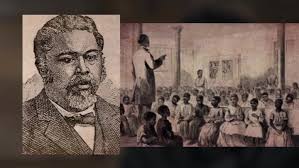As I write this article it is Martin Luther King, Jr. Day. I believe from several years of lived experience that, as believers and the church, we live wiser, more meaningful lives when we have a firm grasp of history and a proper interpretation of the people and events that came before us. Whether we know about Savonarola, the Anabaptists, Richard Baxter, William Carey, David Brainerd, or Dietrich Bonhoeffer, our lives are enriched, and our faith is encouraged to hear about the faithfulness of great saints of the faith who have gone before us. We could write several pages on the light Martin Luther King shined on the racial inequity of our nation. I was invited to speak at the Blue Springs MLK Day Celebration last year. The more I read about MLK, the more my admiration and respect grew for him. He catalyzed a movement that forced the nation to take a collective look into its soul and embrace long overdue principles that started the nation on a slow march towards justice and liberty for all.
However, in this article I want to introduce you to a lesser-known hero of the faith who overcame great difficulties and persecution to preach the gospel, plant churches and strengthen churches; I am referring to George Liele. This freed Georgia slave is one of the unsung heroes of the Kingdom for his passion and perseverance during a time when it was most unwise and unsafe for a black man to speak out or draw attention to himself. He lived by the motto of “woe unto me if I preach not the gospel”. (I Cor. 9:16)
George Liele came to faith in Christ in 1773 and was baptized by his white pastor, Matthew Moore at the age of 23. Shortly after Liele’s conversion, his owner, a Baptist deacon named Henry Sharp, gave him his freedom so he could pursue God’s call upon his life to the gospel. After his conversion, Liele preached for two years in the slave quarters of plantations surrounding Savannah and even on plantations across South Carolina. Liele was ordained on May 20, 1775, becoming the first ordained African American Baptist preacher in America. Even before his ordination, the First African Baptist Church (FABC) was organized in 1773 in Savannah, Georgia under his leadership. He was formally called as the pastor in 1775, and the church was constituted in 1777. It’s amazing to consider that Liele planted the first African (American) Church three years before America was constituted as a nation in 1776. Even more noteworthy to me is that he planted a church the same year he professed faith in the Lord, Jesus Christ, as a new convert. If that’s not extraordinary enough, the church he planted in Savanah, Georgia is still alive and well today, The First African Baptist Church (see video link below).
Then, in 1778, his believing friend and former owner, Henry Sharp was killed in the Revolutionary War. The colonies had just won the Revolutionary War and thus their independence from Britain, but Savannah, Georgia remained under British control at the end of the war. As the British began evacuating Savannah there was concern that some plantation owners might try to re-enslave men and women who had managed to secure their freedom during the war. In 1782, Liele, believing that Sharp’s son intended to re-enslave him, left for Jamaica with his wife and children. Jamaica was a British colony and upon arriving Liele was deeply moved by the thousands of slaves being brought from Africa to work on the sugar plantations. Most of them had never heard the gospel or been taught anything about Jesus. He immediately began preaching the gospel among them and within a short time, many were professing faith in Christ and being baptized. George Liele would hold the baptismal services in public areas like rivers or the ocean and thousands witnessed them causing them to ask about the Christian faith.
Sadly, the public authorities misunderstood Liele’s work and believed he was sowing the seeds of insurrection and sedition among the slave population. He was imprisoned and tried but was proven innocent of the charges and released. One of the things that helped prove his innocence was that he had helped the Ethiopian believers develop a church covenant that encouraged their church members to live peaceably, to submit to the governing authorities, and to act in the best interest of others at all times. It is and has always been, true that believers are the best citizens of any nation. They respect the rule of law and the rights of others.
Through all of these hostilities, George Liele continued to preach the gospel faithfully. After eight years in Jamaica, he had baptized over 500 people and established a strong church in Kingston, Jamaica. Little could he have known the outcome of his faithful ministry. By 1814 there were 8,000 Baptist believers on the island. By 1832 there were over 20,000 believers in Jamaica. By July 31, 1838, slavery was completely abolished on the island. You can’t deny that George Liele’s spiritual impact led to this epic decision.
Not only was Liele an effective missionary and evangelist, but he was also known for encouraging his converts to go preach the gospel to the lost. As a result of his leadership, they went to Savannah, Georgia, Nova Scotia, and Sierra Leone. Consider this; Leile is truly the first American missionary. To put his great accomplishments into perspective: he went to Jamaica 10 years before William Carey left England for India and 30 years before Adoniram Judson left America for Burma. I think this is history worth remembering, celebrating, and sharing whether you are part of an African American Church or a church of any other ethnicity.
To see an inspirational video on George Liele’s life, check out the following two links and pray about showing one in your church to inspire your members to share the gospel, plant churches, and live for the good of others and the glory of God.
https://vimeo.com/781947331/0883075436
The International Mission Board of the Southern Baptist Convention encourages our churches to set aside the first Sunday in February to celebrate the work and leadership of African American and Black pioneers like George Liele and many others.
For promotional materials to lead this emphasis visit https://www.imb.org/george-liele/#resources
Gregg Boll
Director of Missions
Blue River-Kansas City Baptist Association

